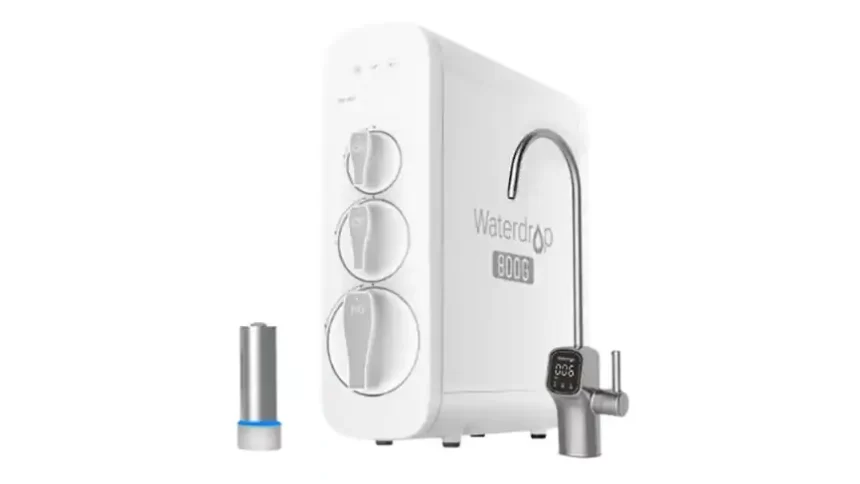In a world that is increasingly emphasizing healthy lifestyles, where water is one of the most basic needs of our lives, water quality has become a global concern. The reverse osmosis system has been been widely adopted worldwide as a popular solution. However, with the advancement of technology, traditional RO systems are gradually being replaced by intelligent variants. So what exactly are these so-called ‘smart RO systems‘? How do they work? And why do they provide better water purification? In this article, we’ll explore in-depth how smart RO systems work, their benefits, and what the future holds. Ready to dive into the world of smart water purification with me?
What is a Smart Reverse Osmosis (RO) System?
A smart reverse osmosis (RO) system is an advanced water purification device that combines classic reverse osmosis technology with modern smart technology. Traditional reverse osmosis systems utilize a semi-permeable membrane to filter water, removing impurities, bacteria and viruses, as well as dissolved salts and chemicals. Smart RO systems, on the other hand, further add automation and intelligent monitoring capabilities.
For starters, smart RO systems have built-in sensors, and these sensors monitor water quality in real time, such as contaminant levels, water hardness and pH. Such real-time data allows the system to automatically adjust the filtration process to ensure that the output water quality always meets preset standards.
Second, these systems can often be connected to the internet via Wi-Fi or other wireless technologies, which means that users can monitor and control their water purification systems remotely via a smartphone app. For example, if the system detects that a filter needs to be changed, it can automatically notify the user and sometimes even self-diagnose and book a replacement cartridge.
In addition, smart RO systems often include self-learning features that allow them to optimize their operation based on a household’s water usage patterns and habits. For example, the system will automatically increase the filtration effort during peak water use periods and decrease it at night or when water usage is low, thus saving energy and reducing unnecessary cartridge wear and tear.
In summary, the Smart RO system is a high-tech water purification solution that integrates automatic monitoring, adaptive filtration, remote control and maintenance alerts. It provides a better, more convenient and smarter water purification experience than traditional RO systems.
Core Technology of Intelligent RO System
When you hear “smart RO system”, you might imagine a device sitting quietly in the corner of your kitchen, but these systems are more than just high-tech on the outside. There’s some pretty nifty technology behind them. Let’s find out more:
Real-time Monitoring and Data Analysis
At the heart of a smart RO system is a complex set of sensors that constantly detect various parameters in the water, such as contaminant levels, TDS (Total Dissolved Solids) levels, water temperature, and more. This data is analyzed in real time, and the system acts like a little spy for the health department, making sure that every drop of water that comes out is pure. What’s more, this data isn’t just binary code that only the machine can read, the user can also get this information through the user-friendly application interface, so you know your water quality like the back of your hand.
Automated Water Quality Adjustment
The automated water quality adjustment feature is another highlight of the Smart RO system. Based on the data collected by the sensors, the system is able to automatically adjust the water pressure, flow rate and temperature to optimize the filtration process. Like a sophisticated cooking appliance, it knows when the temperature needs to be raised and when the heat needs to be reduced, ensuring optimal results with every filtration.
Remote Control and Application Integration
With modern technology, users can control their smart RO systems from anywhere they have internet access via a mobile app. This means you can tweak your home water purification system from the office or check the status of the cartridge while on vacation. The app can also provide tips for regular maintenance, tell you when to change the cartridge, or even place an order for a new cartridge directly from within the app.
Advanced Filtration Technology and Self-Cleaning Features
In addition to the standard reverse osmosis membrane, smart RO systems are equipped with multi-stage filtration technology that removes virtually all impurities from the water. Even better, they have a self-cleaning feature that automatically rinses the membrane and extends the life of the cartridge, allowing you to minimize maintenance.
Advantages of Smart RO Systems
Smart RO systems deliver more than just clean water; their benefits go far beyond basic functionality:
Improved Water Quality
The Smart RO system provides water quality that is superior to traditional water purification methods. Its multi-stage filtration system ensures that impurities, bacteria and viruses are completely removed from the water, while the Smart Adjust feature maintains constant water quality.
Energy Saving and Cost Effectiveness
The intelligent design of these systems means they save energy by automatically adjusting energy consumption according to water quality and usage. And, thanks to the automatic reminder function, they effectively avoid changing filter cartridges too early or too late, which directly reduces long-term maintenance costs.
User-friendly Maintenance
With the app, users can easily monitor the status of the system, get maintenance tips, and adjust settings as needed. This user-friendliness means you no longer need specialized knowledge to manage your water purification system.
Environmental Advantages
By reducing water waste, optimizing energy use, and extending cartridge life, Smart RO systems also have a much lower impact on the environment. Such a system is not only good for you, it is equally friendly to the planet.
These benefits demonstrate that the Smart RO system is more than just an upgrade; it is a revolution in water purification. By providing cleaner water, smarter monitoring and control, and lower maintenance requirements, smart RO systems really do bring unprecedented convenience and benefits to users.
Where Smart RO systems are typically used
Smart Reverse Osmosis (RO) systems are used in a wide variety of environments due to their advanced filtration technology and automation features, these environments include but are not limited to:
- Family homes: Water filter system for home, i.e., householders install smart RO systems to ensure the safety and quality of drinking water, while utilizing smart monitoring to simplify the maintenance process.
- Commercial Spaces: Restaurants, coffee shops, and other commercial environments that require large quantities of clean water use Smart RO systems to provide quality drinking water and access to water.
- Medical Facilities: Hospitals and laboratories require highly pure water for medical operations and scientific experiments, where intelligent RO systems play a key role.
- Industrial applications: Certain manufacturing processes require specific water quality, and intelligent RO systems can provide precise water quality control to ensure production quality and efficiency.
- Schools and Educational Institutions: Educational institutions use these systems to ensure that students and staff have access to safe drinking water.
- Agriculture: Smart RO systems are also used in agriculture, particularly in greenhouses and hydroponic systems, for controlling water quality and precise delivery of nutrients.
- Emergency and Disaster Relief Situations: In the aftermath of a disaster, Smart RO systems can be quickly deployed to provide clean drinking water to affected populations.
- Tourism and leisure: Smart RO systems are also installed in resorts and cruise ships to ensure that tourists have access to quality drinking water.
Conclusion
After exploring smart RO systems in detail, we can see that they not only provide better quality drinking water, but also bring intelligent management and energy saving benefits. Whether in home kitchens or commercial buildings, smart RO systems have proven their potential to improve quality of life and environmental sustainability. As technology advances and user awareness increases, smart RO systems are becoming the first choice for more and more people to upgrade their water purification systems.




